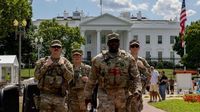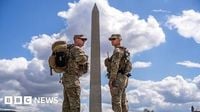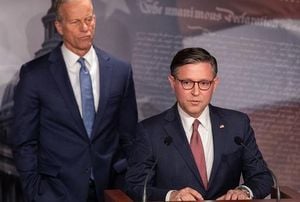On September 4, 2025, Washington D.C. took the extraordinary step of suing the Trump administration over what city officials describe as an “illegal” and “involuntary military occupation” of the nation’s capital. The lawsuit, filed by D.C. Attorney General Brian Schwalb, seeks to immediately end the deployment of thousands of National Guard troops on city streets—a move that has sharply divided local and federal authorities, ignited a heated legal battle, and raised fundamental questions about the limits of presidential power and the autonomy of the District.
The dispute centers on President Donald Trump’s decision to deploy approximately 2,300 National Guard members to D.C. beginning August 11, 2025, as part of a declared 30-day emergency aimed at curbing crime and homelessness. According to the Washington Post, these troops were joined by National Guard units from seven other states, many of whom are armed and visible in neighborhoods throughout the city. Federal law enforcement agents, including those from Immigration and Customs Enforcement (ICE), have also been active in the city, operating checkpoints and detaining suspected undocumented immigrants, as reported by BBC.
Schwalb’s lawsuit alleges that the deployment violates the Posse Comitatus Act—a 19th-century law that generally prohibits the use of the U.S. military for domestic law enforcement. The suit claims that the presence of out-of-state Guard troops, who are not accountable to D.C. residents and lack local law enforcement training, is particularly egregious. “Deploying the National Guard to engage in law enforcement is not only unnecessary and unwanted, but it is also dangerous and harmful to the District and its residents,” Schwalb said in a statement quoted by Axios. “No American city should have the US military—particularly out-of-state military who are not accountable to the residents and untrained in local law enforcement—policing its streets. It’s D.C. today but could be any other city tomorrow. We’ve filed this action to put an end to this illegal federal overreach.”
The lawsuit, filed in federal district court, also argues that the deployment undermines D.C.’s autonomy, infringes on its right to self-governance, and is harming the local economy by driving away business and tourism. According to NBC News, Schwalb’s office claims the deployment inflames public safety tensions and fuels distrust toward local law enforcement. The suit further contends that, while the president does have authority over the D.C. National Guard (unlike in states, where governors hold that power), federal law does not permit the president to use the Guard for local policing without the consent of city leadership—a consent that has not been given.
This legal action comes at a time when Mayor Muriel Bowser, who is not a party to the lawsuit, is walking a careful line. While she has publicly called the National Guard deployment “costly and unnecessary,” and criticized the inefficiency of bringing in troops from other states, she has also credited the federal surge with helping to reduce violent crime. In fact, Bowser signed an executive order earlier this week extending an offer of cooperation with federal law enforcement—though notably, this did not include ICE or the National Guard. “My focus and the focus of our emergency operations center is on planning for the exit out of the emergency next week, and post-emergency operations in the District,” Bowser said, as reported by News4.
The backdrop to this lawsuit is a recent federal court decision in California that found the Trump administration’s deployment of National Guard troops to Los Angeles in June was illegal. U.S. District Judge Charles Breyer ruled that the administration violated the Posse Comitatus Act when it mobilized 4,000 National Guard troops and 700 Marines to Los Angeles for anti-ICE protests. “The evidence at trial established that Defendants systematically used armed soldiers (whose identity was often obscured by protective armor) and military vehicles to set up protective perimeters and traffic blockades, engage in crowd control, and otherwise demonstrate a military presence,” Judge Breyer wrote. “In short, Defendants violated the Posse Comitatus Act.” The White House is appealing that decision, and the D.C. lawsuit leans heavily on this precedent.
White House spokesperson Abigail Jackson has pushed back forcefully against the D.C. lawsuit, insisting that President Trump is “well within his lawful authority to deploy the National Guard in Washington D.C. to protect federal assets and assist law enforcement with specific tasks.” In a statement to Axios, Jackson characterized the legal challenge as “nothing more than another attempt—at the detriment of D.C. residents and visitors—to undermine the president’s highly successful operations to stop violent crime in D.C.” The White House has also touted the operation’s results, claiming that hundreds of arrests have been made since the deployment began and that crime rates have fallen as a result.
Indeed, crime statistics from the Metropolitan Police Department (MPDC) appear to support part of that narrative. According to data published by the MPDC and cited by BBC, violent offenses in D.C. peaked in 2023, hit their lowest level in 30 years in 2024, and have continued to fall in 2025. Violent crime overall is down 26% this year compared to the same point in 2024, and robbery is down 28%. Bowser herself has acknowledged this trend, noting that the increased support from the federal government has helped drive down carjackings and other violent crime. However, critics argue that such gains do not justify what they see as an unconstitutional federal intervention.
Meanwhile, the political stakes are rising. Schwalb, who launched his re-election campaign on the same day as filing the lawsuit, finds himself in the crosshairs of conservative members of Congress. According to the Washington Post, a House bill has been introduced that would replace the D.C. Attorney General with a presidential appointee—a move that would further erode the city’s autonomy. The White House has indicated plans to extend the National Guard deployment in D.C. through the end of 2025, though it remains unclear whether all 2,000-plus troops will stay that long or if the move is designed to ensure deployed personnel receive full military benefits.
As the case, now assigned to Judge Jia M. Cobb, moves forward, no hearings have been scheduled yet. The outcome could set a major precedent for the balance of power between the federal government and local authorities—not just in Washington, but in cities across the country. With both sides digging in, the nation’s capital has become the latest—and perhaps most high-profile—battleground in a long-running debate over the role of the military in American civic life.
For now, D.C. residents and business owners are left to navigate a city where the lines between local governance and federal authority have rarely felt so stark—or so fraught with consequence.





